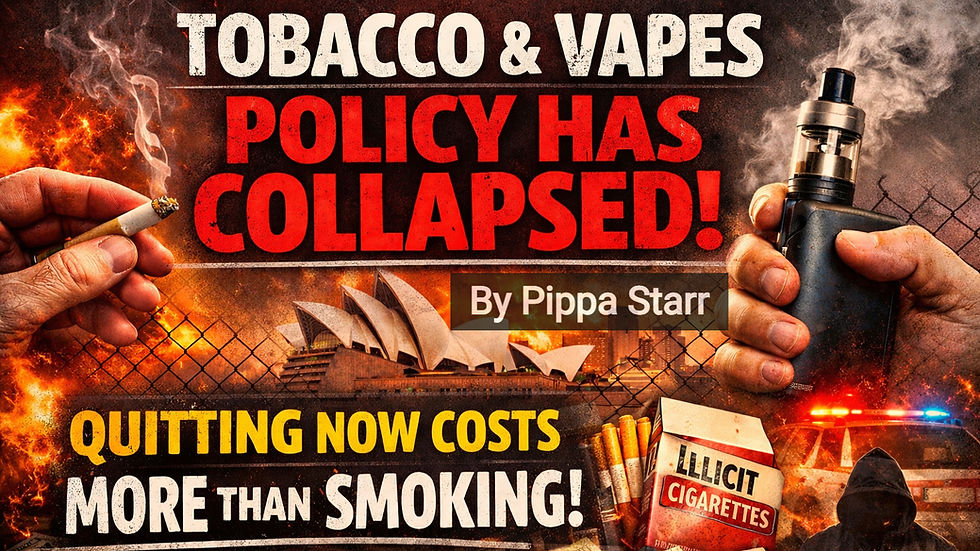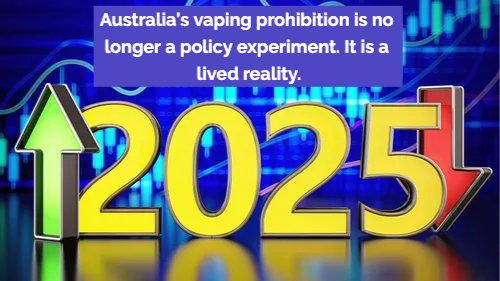When “Lessons from Abroad” Become Spin: How Public Health Experts Twist the Truth About Australia’s Tobacco Disaster
- Alan Gor

- Oct 30, 2025
- 6 min read

Alan Gor 30 October 2025
The UK’s LSE British Politics and Policy blog has published yet another predictable puff piece defending prohibition and dismissing anyone who dares to mention the consequences.
Titled “The Tobacco and Vapes Bill – why we need to be careful with international comparisons,” the article pretends to be a balanced academic review. In reality, it’s a carefully worded attempt to rewrite what’s happening in Australia and New Zealand, the two countries the UK is now copying, and to reassure politicians that prohibition can somehow work if it’s just “implemented properly.”
Let’s be honest: that’s pure fantasy.
Australia – the model of failure
The authors claim there’s “no robust evidence” that Australia’s black market, gang wars, and firebombings are linked to over-regulation or high tobacco taxes. Instead, they blame “weak enforcement” and “inconsistent penalties.”
That’s the oldest trick in the public-health playbook: admit the chaos, but deny the cause. They’ll tell you the policies are fine; it’s just that the police didn’t crack down hard enough.
But the evidence on the ground paints a completely different picture.
Over the past decade, Australia has doubled down on bans, taxes, and “denormalisation” campaigns. The result?
Smoking is rising again among young adults for the first time in decades.
Organised crime has taken over the retail tobacco trade.
Ex-smokers are being pushed back to cigarettes because safer nicotine alternatives were made illegal.
This isn’t hypothetical, it’s what’s happening right now. The illicit tobacco market is worth over $5 billion a year, fuelled by the very policies that were meant to make smoking disappear. Small business owners are being extorted and firebombed. Everyday consumers are being criminalised for buying what they once could purchase legally.
And yet, the LSE authors tell UK politicians that the problem isn’t with the policy; Australia just didn’t “close enough shops.”
That’s not public health. It’s ideology
How prohibition destroyed trust
In practice, Australia has created the perfect conditions for criminal opportunism. Tobacco taxes have risen by more than 300% since 2010, while vaping products, the one thing that could have replaced cigarettes, were pushed into prescription-only obscurity. The government’s war on nicotine didn’t remove demand; it merely transferred it to the black market, where it now thrives untaxed and unregulated.
The results are plain to see:
A wave of arson attacks and extortion linked to illegal tobacco syndicates.
Border seizures of billions of cigarettes are a symptom, not a success story.
Retailers living in fear, as criminal gangs compete for turf that public health policy handed them on a silver platter.
Meanwhile, the same officials who built this disaster continue to congratulate themselves at conferences, publishing “success stories” in journals while the country burns literally.
New Zealand – the selective storytelling
The LSE article also tries to rewrite the story of New Zealand’s repeal of its generational tobacco ban, claiming it was undone by “tobacco industry interference.” Convenient, isn’t it? When a policy collapses under its own weight, just blame Big Tobacco.
But the truth is simpler and far more inconvenient.
New Zealand’s new government realised that the plan was unworkable. It was expensive, divisive, and unenforceable. Enforcement agencies warned of spiralling illicit trade; retailers warned of economic damage; and public support was collapsing.
Even Māori health leaders — the very communities the law was designed to protect admitted the policy risked deepening inequities, not fixing them. The law would have criminalised the poor while enriching smugglers.
You won’t read that in the LSE piece. Instead, the authors recycle the tired narrative that any opposition to prohibition must be “industry-linked” as if ordinary citizens, independent researchers, and ex-smokers who support harm reduction don’t exist.
That’s not science, that’s a smear tactic.
Sweden – the inconvenient success
And then there’s Sweden, the country that actually did it.
Sweden is on the verge of becoming the first nation in the world to reach “smoke-free” status (smoking prevalence below 5%). But it didn’t get there through bans, taxes, or fear campaigns. It got there through harm reduction by allowing and even normalising low-risk alternatives like snus and nicotine pouches.
Rather than celebrate this success, the LSE authors bend over backwards to explain it away. They claim Sweden’s progress has nothing to do with snus, but rather with “taxation and advertising restrictions.”
That’s absurd. Sweden’s smoking rate collapsed precisely as snus use exploded. Every credible dataset from Eurobarometer to WHO’s own surveillance confirms it. Sweden’s men have the lowest rates of lung cancer in Europe, not because they stopped using nicotine, but because they stopped burning it.
No bans. No hysteria. No war on vapers. Just pragmatic acceptance that nicotine itself isn’t the problem, combustion is.
Instead of learning from that, UK health bureaucrats want to replicate Australia’s prohibitionist model, complete with vape bans, “tougher enforcement,” and fear-based messaging. They call it “protecting children,” but it’s really protecting their ideology.
Meet the Authors: The Echo Chamber at Work
The five authors of the LSE article all come from the same tightly knit circle of WHO-aligned tobacco control academics who have spent years advocating for prohibition-style policies — and opposing harm reduction. Their “international comparisons” read less like independent research and more like a coordinated defence of the same failed model.
Professor Coral Gartner – University of Queensland
Director of the Nicotine and Tobacco Regulatory Science Research Group, Gartner has been one of the leading defenders of Australia’s prescription-only vaping model, the very policy that fuelled the black market. She has repeatedly argued that e-cigarettes should remain tightly restricted, despite mounting evidence of failure.
Dr Cheneal Puljevic – University of Queensland
A frequent collaborator of Gartner’s, Puljevic’s research focuses on “tobacco endgame” and “denormalisation” strategies. Her work regularly cites and reinforces the same small circle of Australian and New Zealand academics who support total nicotine control, creating a closed feedback loop of approval.
Professor Janet Hoek – University of Otago, New Zealand
Hoek helped design key parts of New Zealand’s now-abandoned Smokefree Aotearoa 2025 plan and has been one of its most vocal defenders. Even after its repeal, she insists the failure was due to “industry interference” rather than policy overreach.
Dr Britta K. Matthes – London School of Hygiene & Tropical Medicine
Matthes belongs to the UK academic network closely linked with WHO’s Framework Convention on Tobacco Control (FCTC) advocacy groups. Her work routinely frames harm reduction as a “tobacco industry narrative,” despite overwhelming independent evidence to the contrary.
Lisa Lennartsdotter Ermann – Karolinska Institutet, Sweden
A researcher on nicotine use in Scandinavia, Ermann has consistently downplayed Sweden’s success with snus, instead attributing its low smoking rate to taxation and bans, a narrative that fits perfectly with WHO and EU messaging, both of which oppose snus despite its proven public health benefits.
Together, these authors form what can only be described as a policy echo chamber of academics citing one another, recycling the same talking points, and defending prohibition regardless of outcomes. The message never changes, only the excuses.
That’s not diversity of thought. It’s institutional groupthink.
The illusion of moral superiority
One of the great ironies of modern tobacco control is that it cloaks moral panic in the language of “evidence-based policy.” But scratch the surface and it’s ideology all the way down.
For these academics, the goal isn’t reducing harm, it’s eradicating nicotine. They see the act of using nicotine, in any form, as a moral failure to be punished rather than a behaviour to be managed. That’s why even successful harm-reduction models like Sweden’s are ignored or discredited; they contradict the moral narrative.
This moral crusade has warped public health into a form of social engineering. Instead of helping people quit smoking by offering safer choices, the system now seeks to control and shame them through punitive laws, taxes, and access restrictions.
The pattern is clear
This isn’t about evidence. It’s about control.
Whenever prohibition fails, the same experts claim the policy wasn’t strict enough.
Whenever harm reduction succeeds, they pretend it didn’t happen.
Whenever anyone challenges the narrative, they’re accused of parroting “industry talking points.”
It’s not debate, it’s dogma.
Meanwhile, real people are paying the price:
Smokers who can’t access safer alternatives.
Shopkeepers caught between the law and organised crime.
Taxpayers are losing billions to the black market.
If the UK follows Australia’s lead, it won’t be creating a “smoke-free generation.” It’ll be creating a criminal generation one driven underground by bad laws and moral panic.
Public health in Australia has become a theatre of denial where failed experiments are recast as global success stories, and evidence that contradicts the script is dismissed as misinformation.
The UK should take a long, hard look at what’s really happening here before copying it. Because once you hand your nicotine policy over to ideologues, it’s almost impossible to get it back.
Prohibition doesn’t build a healthier society; it just builds a black market.
And as Australia proves, it’s a very profitable one.


